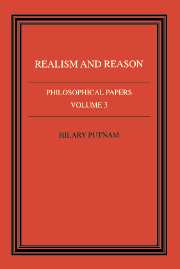Book contents
- Frontmatter
- Contents
- Dedication
- Introduction
- 1 Models and reality
- 2 Equivalence
- 3 Possibility and necessity
- 4 Reference and truth
- 5 ‘Two dogmas’ revisited
- 6 There is at least one a priori truth
- 7 Analyticity and apriority: beyond Wittgenstein and Quine
- 8 Computational psychology and interpretation theory
- 9 Reflections on Goodman's Ways of Worldmaking
- 10 Convention: a theme in philosophy
- 11 Philosophers and human understanding
- 12 Why there isn't a ready-made world
- 13 Why reason can't be naturalized
- 14 Quantum mechanics and the observer
- 15 Vagueness and alternative logic
- 16 Beyond historicism
- Bibliography
- Acknowledgements
- Index
11 - Philosophers and human understanding
Published online by Cambridge University Press: 06 January 2010
- Frontmatter
- Contents
- Dedication
- Introduction
- 1 Models and reality
- 2 Equivalence
- 3 Possibility and necessity
- 4 Reference and truth
- 5 ‘Two dogmas’ revisited
- 6 There is at least one a priori truth
- 7 Analyticity and apriority: beyond Wittgenstein and Quine
- 8 Computational psychology and interpretation theory
- 9 Reflections on Goodman's Ways of Worldmaking
- 10 Convention: a theme in philosophy
- 11 Philosophers and human understanding
- 12 Why there isn't a ready-made world
- 13 Why reason can't be naturalized
- 14 Quantum mechanics and the observer
- 15 Vagueness and alternative logic
- 16 Beyond historicism
- Bibliography
- Acknowledgements
- Index
Summary
I find myself in the position that Jerome Bruner (1976) found himself in a few years before me. I agreed to give a Herbert Spencer lecture; I planned to give a lecture on the topic of scientific explanation; I intended to discuss a particular controversy in that field, the controversy about whether scientific theories are ‘incommensurable’, about whether there is any ‘convergence’ in scientific knowledge; but I felt increasing dissatisfaction with this entire idea as the day approached. Bruner's dissatisfaction led him to some reflections about the history and present state of psychology. I intend to follow his example and ruminate on the activity itself, the activity of philosophy of science, in my own case, and on certain dissatisfactions I feel with the way that activity has been pursued, rather than discuss a particular issue within it. However, the particular issue I mentioned will come up in the course of these ruminations.
Logical positivism is self-refuting
In the late 1920s, about 1928, the Vienna Circle announced the first of what were to be a series of formulations of an empiricist meaning criterion: the meaning of a sentence is its method of verification. A. J. Ayer's Language, Truth and Logic spread the new message to the English-speaking philosophical world: untestable statements are cognitively meaningless. A statement must either be (a) analytic (logically true, or logically false to be more precise) or (b) empirically testable, or (c) nonsense, i.e., not a real statement at all, but only a pseudostatement. Notice that this was already a change from the first formulation.
- Type
- Chapter
- Information
- Philosophical Papers , pp. 184 - 204Publisher: Cambridge University PressPrint publication year: 1983
- 7
- Cited by



